- Home
- Ellen Datlow
The Green Man Page 20
The Green Man Read online
Page 20
The Captain was a seasoned agent and did not wither under sarcasm. “You are suspected of plotting treason against the Crown. The stalk that has been cultivated in your cow pasture is a gross incitement of passions and an exhortation of republican sentiments.”
“How can you call it a cow pasture? The cow was lost in a bad exchange long ago,” said Filthy Tilda. “Dear dim Jack the Lesser traded her for a bean. We cooked it for four days and it was still as hard as stone; useless. Like your heart. As for our turning to a cash crop in our time of poverty, can this be considered a crime? We must live in order to pay taxes to the Crown, after all, or how would you feast so well at Broad Betty’s tavern?” She could smell smoked oysters on the Captain’s breath.
“A crop,” said the Guard. “A single plant? Don’t joke with me.”
“You’ve seen it? Well, you can hardly miss it. In the instance of a variety such as that, yes, a crop. The single sprout takes all our management. But I don’t see how this should cause agitation to the throne or the court.”
“Your neighbors protest you’ve been singled out for special government agricultural aid, and their jealousy and suspicion arouses the mob passion for justice.”
“If there were any special aid to be had, we’d welcome it. My son and I spend our every waking hour drawing buckets from the well to keep that thing from withering. If you could spare a phalanx of crisply dressed dragoons to form a bucket brigade twice a day, His Majesty’s humble subjects could find the chance to pause and breathe for a moment now and then. Isn’t that the proper use of government?”
“Don’t be saucy. We’re going to have to send you into the cells until we decide what to do about your plant. What do you call it, anyway? What sort of plant is it?”
“What a well-attended Captain of the Guards, who doesn’t recognize a bean plant when he sees it!” shouted Filthy Tilda. Jack the Lesser looked up in alarm. “You’ve been too long away from real life, fellow, if you can’t identify the basic stuff of the vegetable plot!”
Guards hauled them off, gently enough, and turned them into a cell with a single cot. Jack the Lesser sat on the floor with his back against the wall. His mother fell into a deep sleep at once. The ladybugs came out to smell the night air and flew off through the bars of the window.
Having had a run in with a goose as a child, the Captain had a secret fear of farm animals. He was pleased to know that the family didn’t keep fowl, and that the last livestock had been sold. So though the hour was still late, he set out to see the aberrant growth for himself, close up.
As he paced the distance, along a route first cobbled, then rutted, and finally overgrown with tall grasses, he considered the state of the Crown. Agricultural treason was a somewhat ridiculous charge, but of late things had been less than stable at the court. Perhaps the King, in trumping up charges of sedition, was seeking to divert public attention from his mismanagement of the treasury. Filthy Tilda and her idle sons had provided a perfect foil. The Captain did his homework: A little judicious listening to the chatter around Broad Betty’s inn table had revealed the neighborhood’s general sentiments about the family, which weren’t warm. Tilda and sons had paid no taxes for several years—people of that sort could be said to be the real reason the treasury was being milked dry—and when the aberrant vegetable apparition had sprung up in their useless barren meadow, word had been passed to the King’s advisers and come back again to the Captain: Secure that family and make sure the public hears about it.
With her everyday expression betraying greed and resentment, Filthy Tilda would not quickly inspire her neighbors to clamor for her release. Of this the Captain was fairly sure. But the lad seemed blameless enough, only dull as ditch-water. He seemed to live in a magic land of his own making, with that congress of bugs in his sleeve. A simpleton like him would have been unlikely to forge strong friendships among the brawny stupid lads of the surrounding farms. So there seemed little chance of strenuous objection about their being detained pending the registration of charges before a magistrate in the morning.
Still, thought the Captain a bit wistfully, someone might object. Someone should. There always ought to be someone who notices the disappearance of neighbors.
As he approached the district known as Damp Meadows, the astonishing bean plant seemed less a silhouetted embellishment against the sky and more a change in climate. A heaviness in the air, a clammy sort of coolness. The odor of huge waxy bean flowers was repellant. A few had dropped already and the Captain had to maneuver about them. If his sense of scale wasn’t too far off, the beanpods themselves would be the size of small canoes.
He reached the base of the plant. It was as broad around as the central tower in the palace. The skin of the stem was smooth—unnaturally smooth; it gave him the shivers to feel it. Any plant this large was supposed to be a tree, and trees had bark: cracked, striated, shagged. This surface was smooth, glossy, slightly warm, as much like human skin as anything else. He withdrew his hand in amazement and a faint sense of excitement.
Rearing back, he noted how the stalk twisted ever so faintly; sending out leaves, shoots, tendrils, growing even as he watched—or so he imagined. The thing was a menace, but a captivating one. Its root system must stretch for miles already. There was no need to call up a bucket brigade. This thing had no use for human tending. Filthy Tilda and her stupid son were kidding themselves if they thought they had any hand in how it thrived so mightily.
From what rare bean can such a thing grow?
When Jack the Greater returned that morning, hauling a pot that steamed and bubbled with a different variety of victual every time you removed its lid, his mean-spirited mother was not there to receive it. So he ladled himself a portion of milled oats with milk and apples, and covered the pot, and then opened it again to find several quarts of fresh-brewed coffee, sweetened with refined sugar and lightened with cream. Following this he worked his way through a mound of fennel-and-garlic pork sausages, then several dollops of eggs made with fresh mustard and tarragon leaves, and though he thought he smelled something faintly syrupy, like buckwheat pancakes, he left the pot alone after that and went to find his mother and brother.
It was unlike them to wander off. Where would they go? The only cow had been sold. Jack the Greater did not care to venture far from the hovel—he knew the family wasn’t much liked in the neighborhood—but he could think of little else to do without his mother to chastise him or his brother to berate. Several dozen ladybugs on the doorsill were carefully lined up to spell the word HELP, but Jack the Greater couldn’t read, and he stepped on half of them as he wandered in and out, bored and—for once—filled to satiety.
After a while he relieved himself behind the old pig shack and did up his trousers. Then the urge took him over again and he was drawn to the trembling promise; and hand over hand he began again to climb.
The Magistrate filed charges of sedition with intent to overthrow the throne, and by noon the town criers were studying the text so they could report the news with a semblance of accuracy. Filthy Tilda and Imbecilic Jack! Stalking the King! The sleight-of-word would attract eager listeners on street corners and in pubs, who might tip if the news was juicy and they’d had ale enough to behave stupidly.
Jack the Lesser was chagrined. Only two ladybugs had come to see him. Berrybright and Wilhelm. He watched them do a pas de deux in his honor, and tried to interest his mother, but she was irate at what she could hear through the barred windows of their cell and she wouldn’t attend to the ladybugs at all.
“Stalking the King! Are they mad? I’ve never laid eyes on the blessed gentleman!” She was keeping her language respectful in case there were eavesdroppers about. “This is a huge mistake! Were the King’s minions as sensible as the good Majesty must be, they would know I’ve nothing but awe for the power of the throne!”
The palace was only a few moments from the prison. A dog nosing his way from jail to jardinière would follow this menu of smells: human offal in the op
en drains of the prison facilities; wet paving stones; clots of horse manure; splashes of old sour ale and splashes of old sourer vomit; planking over a recessed gutter with a reek of standing water, as the gutter flowed poorly when at all; paving stones again, swept free of interesting litter; a lane of cobbles leading in a broad path along an iron fence much tagged with dog pee; a scatter of hydrangea petals on brick; a colder skid of gray marble, shiny as if in the act of reflecting the gray sky. Then the dog’s nose would bump up against the wrought iron gates leading into the palace gardens, whose impeccable lawn hosted a fleet of white peacocks. Its borders were not so much riotous with color as downright giddy; its ornamental shrubbery was cut in the fanciful forms of naked satyrs, coy dryads, mermaids and phoenixes and acrobatically inclined bears.
The dog, like the peasants, would be restrained by the elegantly twisted iron. However, a delegation of ladybugs would scarcely notice the matter and could make their loopy way right through, even to the marble windowsills of the King’s music chambers, if they were so inclined.
Within such a chamber, with its hangings of yellow silk, its yellow parquet floors, its plush plum-colored ottomans and sofas, the King of Kingland wandered, humming a melody. His was a nasal voice, unmemorable in the speaking mode and unforgettable, sadly, in the singing mode. Though hardly a despot, indeed more distracted by the affairs of governing his subjects than obsessed about them, he did insist on giving annual public concerts to show off what his music teachers, with understandable lack of precision, called his improvement.
“Dum diddle diddle fiddle fee,” he intoned, moving his index finger up and down as if to remind himself in which direction the melody was intended to turn. “The words come later when the tune kicks in, dum diddle diddle fiddle fee fee fee. For a fee, just a little, or for free free free, I will hum diddle diddle, little me!”
“Darling boy,” said the Queen Mum, busy with tatting, “there’s some sort of annoying pest in the room making a dreadful noise.”
“You’re shameless cruel, Mother; I’ve always said it and you can’t deny it.” He was cut to the quick.
“Oh, for once I’m not talking about you, though I hate to have missed the opportunity,” she said, for she was cruel and she liked to be so. “I mean there’s a bug or something flying about, clicking its wings and making the most tremendous row.”
“Where?” said the King, who did not care for bugs of any sort.
“Well, it fell on my needlework for a moment, I think, and then pushed off and went over on your side of the room. It’s my belief that the poor thing was trying to smash itself brainless to get away from the sound of your little song.”
“What sort of a bug?”
“A stinging one, or a pinching one, or a tickling one, or the sort that whines in the general neighborhood of the ear trumpet, or lays eggs in your hair, as far as I could gather. One whose nasty ways are set off by the sound of tuneless doggerel.”
“Very sweet, Mother.” The King sat down and drew his knees up under his chin, and circled them with satin-sheathed arms. “You’ve ruined my rehearsal.”
“You were rehearsing, were you? I had thought you were performing glottal surgery on yourself through some brave new technique of adenoidal hypnosis.”
A ladybug settled on the antimacassar and made his way along to the King’s shoulder. In the King’s peripheral vision it was like a spot of blood, rolling slowly toward him. Angry at his mother, he reached out and smashed the bug into a pulp, then flung the starched cloth out the window into the bushes. “What do you make of the giant vegetable growth down in Damp Meadows?” he asked, to change the subject. “If you stand here and strain just a bit, you can see a leafy sort of tasseling leaning against the sky. Do you know, the top is completely lost in the clouds?”
“I don’t strain for anything,” said the Queen Mother. “Unseemly.”
Thanks, perhaps, to his sizeable and nourishing meal, Jack the Greater was lighter on his feet than usual. A good thing, too. He needed the speed and all the strength he could muster. Swinging with one hand he scrambled down the stalk. His other arm was folded like a clamp across the breast and neck of the angry goose. Jack’s leggings were bloody and shredded; the bird had a capable beak, able to scissor, tweak, pinch, and poke. Jack flung the bird on the ground, half hoping he might brain her, reduce her to a feathery factory specializing in golden eggs, a factory without an attitude. But the bird sprang up like a splash of white venom, lunging and lunging; Jack had to retreat to the cottage. He availed himself of a savory cassoulet bubbling away in the pot while the goose honked her imprecations and fouled the footpath leading toward the mighty base of the stalk.
But after a while she found a damp heap of old moldery straw in a corner of the yard, and by the time evening arrived she had delivered herself of several hours’ worth of muttered curses as well as a single luminous egg of gold, sitting in its floppy translucent sac. The goose rubbed the goo off her tail-feathers, ate a few ladybugs malingering about the place, and when she wandered off to take the air, Jack took the egg.
It slid easily enough out of its sacking, which was no more than a kind of loose net. He weighed it in his hands. You’d have guessed an army of Doytchish jewelers had spent weeks polishing it with chamois cloths. Jack, not much given to fancifulness, leaned in and looked at how the curved surface of the egg distorted the reflections. If he leaned his forehead nearer, he could see himself with a much more prominent brow, bespeaking a lofty mind; if he cocked his head back and looked down through slitted eyes, his stub nose took on a patrician slope, his weak chin a noble prominence. The light of the evening sun, breaking through the shifting leaves of the stalk, caught on the egg, making brazen embers of his eyes. They looked like the eyes of a fellow who had ideas.
And maybe his forays abroad were expanding his horizons, as forays were said to do. For Jack the Greater had an idea, suddenly. If the goose could be cozened into performing this simple task on a daily basis, Jack could pay backtaxes.
With a strong tendril of beanstalk Jack made a necklace for the goose, and tethered her to the handle of the magic cooking pot. Then, a golden egg in each pocket threatening to pull his tattered trousers right off his slender hips, he set off to the City. What would his horrible mother say, to learn that her ne’er-do-well son had solved the family budget problems!
At the office of the Tax Collector tongues were silenced, doors were opened, and Jack was ushered deep into sumptuous interior rooms of the sort he had never glimpsed before. When summoned, the Chancellor of the Exchequeur came running from his ablutions with his buttons incompletely fastened. He paused and gaped at the egg of gold. In the silence of the Chancellor’s reverence, Jack the Greater heard the town criers broadcasting news of the arrest of his mother and brother.
He arranged with the first egg to pay all outstanding debts to every government office. With the second he paid the bail on his relatives, and when the family was reunited at home, enjoying a smart little scupper of champagne followed by a pasta dish steaming with Parmeshanee and the most rare and precious lake oysters, Jack the Greater told them tales of his adventures in the Afterlife.
Then, for a time, was Filthy Tilda reborn as La Tilda. The goose obligingly brought forth another golden egg every few days. Within a week the family members were arguing over whether to shift their domicile, and if so, to which toney address. La Tilda favored a tall townhouse on one of the city’s more prestigious squares, where in elegant gowns she could be seen sweeping in and out of the doorway. Jack the Greater, eyeing the beanstalk, wanted to be someplace out of its shadow, away from the crush of rotting vegetation should it ever begin to fall of its own weight. He considered the highlands, the Cobalt Coast, the Herring Isles. But Jack the Lesser said he would miss his ladybug friends, especially Karl, Albert, and Sigmund, with whom he pretended to have long philosophical discussions.
For scut work, La Tilda hired a local maiden named Rindabella and renamed her Rotten Ronda.
The King, as expected, won first place in the Amateur Singing Competition.
“Divine!” said some.
“Captivating!” said others.
“Sounded like a cow in an abattoir,” said La Tilda.
“Shh!” said those around her.
“I’m not indulging in poetic nastiness,” said La Tilda. “How many of you have ever escorted a cow to the abattoir? They make a certain noise. Don’t credit me with rudeness. I’m merely making an informed comparison.”
But she made it loudly enough that news of her opinion reached the King’s ears, as well as his mother’s. The King blushed and didn’t comment. The Queen Mother tried to control a smirk, but failed.
“Money does that to one, lifts the muddy out of the gutter and plants them in your parlor,” she said. “Isn’t the Crown rapidly going bankrupt, Bedwad? Perhaps you’re not taxing this La Tilda enough.”
Jack the Greater wasn’t as great as all that, thought Rotten Ronda, looking fondly at the lump in the hay next to her. Wonder how his brother would be? Wonder how they would be together?
The goose waddled over and deposited an egg in Rotten Ronda’s lap. She would have pocketed it, had she been wearing clothes with pockets; she would have tucked it into her bosom had her bosom not been liberated from its binding. So as Jack the Greater snored off his little death, she kicked the egg under the straw for retrieval later on. Then she lay back and closed her eyes, the better to enjoy the tickling perambulations of three ladybugs who were out for a stroll on her left breast.
Through a crack in the boards, Jack the Lesser watched with immodest jealousy. That his ladybugs should take such license! What on earth were they up to? Well, they were up to the nipple, and the nipple was up to something, too. He looked away.
When Rotten Ronda and La Tilda, woman to woman, exchanged words about the relative crudeness of the Jacks, they both laughed with the soft gusto reserved for connoisseurs. Then La Tilda fired Ronda for not knowing her station.

 Inferno
Inferno The Best of the Best Horror of the Year
The Best of the Best Horror of the Year When Things Get Dark
When Things Get Dark A Whisper of Blood
A Whisper of Blood Echoes
Echoes Blood Is Not Enough
Blood Is Not Enough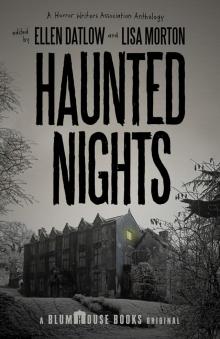 Haunted Nights
Haunted Nights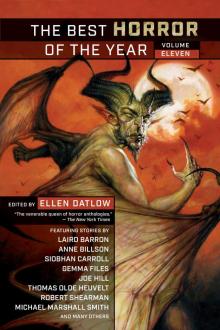 The Best Horror of the Year Volume Eleven
The Best Horror of the Year Volume Eleven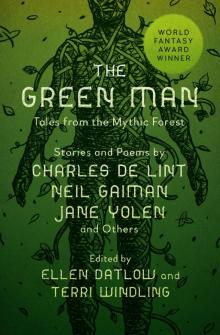 The Green Man
The Green Man The Dark
The Dark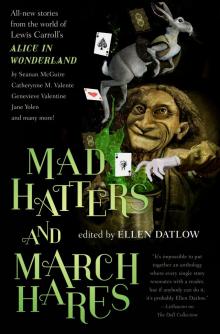 Mad Hatters and March Hares
Mad Hatters and March Hares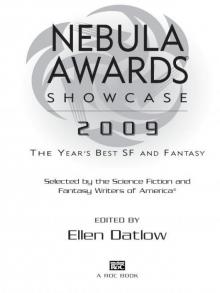 Nebula Awards Showcase 2009
Nebula Awards Showcase 2009 The Devil and the Deep
The Devil and the Deep